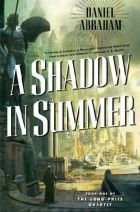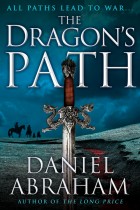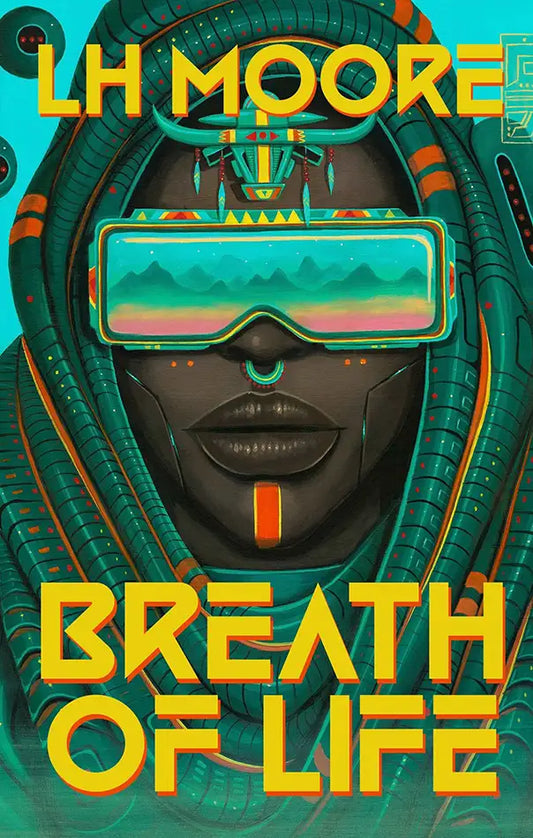
What do authors M.L.N. Hanover, James S.A. Corey, and Daniel Abraham have in common? Well…actually, they all share--at least in part--the writing chops and creative mind of Daniel Abraham. Over the past ten years, Daniel Abraham has published over a dozen novels, spanning epic fantasy (as himself) to urban fantasy (as M.L.N. Hanover) to far-future science fiction (as James S.A. Corey with Ty Franck). His short fiction has appeared in venues such as Asimov's Science Fiction Magazine, Realms of Fantasy, and The Magazine of Fantasy & Science Fiction, among many others. His novel Leviathan Wakes with Ty Franck was a finalist for the 2012 Hugo Award, and his shorter works have also garnered nominations for the Hugo, Nebula, and World Fantasy awards.
In this issue of Apex Magazine, Daniel Abraham kindly shares his short story, "Hurt Me," and spends some time with us discussing pseudonyms, leading ladies, juggling multiple projects, and even a bit about gaming. To learn more about Mr. Abraham, M.L.N. Hanover, and James S.A. Corey, visit his website at www.danielabraham.com.

About "Hurt Me":
APEX MAGAZINE: "Hurt Me" takes an original spin on what could have been just another vengeance story. I think in part, one of the things that struck me about this particular tale was the complexity of emotional conflict. As in real life, the physical removal of Corrie's abusive husband (via murder) isn't the end of her trials, nor her only trial. Her mother provides guilty pressure, the neighbors quietly judge and watch, her new boyfriend—unintentionally, perhaps—provides pressure in the hopes of a better future, and her own memories haunt her and keep her from moving forward (thus the return to the house). While the dead husband is ostensibly the central villain, there are many conflicting players. Could you talk a little about how you approached developing these subtler tensions (which in tandem add up to a crackling pressure almost as strong as the ghost in the house, itself)?
DANIEL ABRAHAM: Actually, that grows pretty-much organically out of the constraints of the story. "Hurt Me" is one of the most technically difficult things I've ever written because the control of information in it is vicious. The whole thing is tightly focused on the one character whose mind we never have direct access to. We see her, we hear her, we even know how her body feels to her, but if we were ever in her mind, the story's structure would collapse. So instead, we need information--and misdirection--to come in from other places. The narrator only steps in once at the beginning to tell you that the real estate agent (and by extension all the people trying to make sense of her) are wrong. Apart from that, everything you get comes from third parties or the physical descriptions of what's happening. And since she's the only one who's totally in on the game, people have to misunderstand her.
AM: Cassie in "Hurt Me" is a complex, yet believable female character, and many of your books make certain that female characters aren't all relegated to the "I'll wait for you until you return" role. As epic fantasy can be so male-oriented, I'm curious: have you always gravitated toward peopling your fantasy fiction with lead female characters, or is it something you've consciously chosen to do over time?
DA: It's more something I discovered than something I chose. Sometimes I think writers are kind of like theater troupes with a particular stable of actors that come to play particular roles. One of the actors I've got is this very powerful middle aged woman. She was Amat Kyaan in A Shadow in Summer, and Chrisjen Avasarala in Caliban's War, and Clara Kalliam in The Dagger and the Coin books. And as I've become a middle-aged man, I have to say the intellectual company of thoughtful, middle-aged women is one of my real pleasures in life.
There are some decisions I've consciously made in my work to address moral issues about race, sex, and gender, but that particular one just happened.
AM: You've mentioned in the past that many of your stories are germinated from a clear vision of one or several scenes you'd like to write, and from there the story develops. For "Hurt Me," what was the initiating scene, if there was one? If there wasn't, what sparked this story?
DA: "Hurt Me" is only sort of my story. My experience with it grew out of my work with Ty Franck, who's the other half of James SA Corey. He had the original idea of a kind of inverted ghost story, and we used it as a kind of convenient subject during conversation we were having about plot structure. So we built this plot outline together as a thought experiment, and he actually went ahead and wrote his version of it. But I kept coming back to it and wanting to do *my* version. So eventually, I asked his permission, and he gave me his blessing, and I did this.
The story has been in a couple venues before, including a performance of it on Podcastle. It's been interesting to see how many folks find it morally ambiguous. For me, it's damned near unequivocal.
About Writing in General:
AM: What instigated the shift for you moving from full-time tech support to full-time writer?
DA: Raw luck, mostly. I'd been working tech support for about a decade, and I'd been looking at going back to school. There's a really good medical school in my town, and I was taking classes to fill out the prerequisites for the physician's assistant program. When my daughter was born, the plan was that I'd be the stay-at-home dad and start applying for school once she was old enough for daycare. My first novel came out about a month before she did, and I happened to catch the attention of my foreign rights agent. He sold the Long Price Quartet books in enough markets that it became financially possible to consider taking the risk of going full-time.
The moment I really decided, though, I was in California at a diner with Marv Wolfman. At the time, he was working on a project using comic books formats to do remedial-level education. This is the guy who was behind Crisis on Infinite Earths, and he was doing comics for basic civics lessons. He said that, if he was willing to be flexible, that there was always work. I was already at my midlife "I can do anything, but I can't do everything" moment, and he really tipped me over the edge.
AM: Did you find that becoming a parent changed the way you approached writing or how you approached themes within your writing, compared to how you worked before (besides schedule shifts, of course!)?
DA: Honestly, I'm not sure. When the kiddo showed up, I know I went through this fairly profound cognitive shift. It's as basic as that I used to be a heavy sleeper, and I'm not anymore. I'm aware that the shift affected how I see the world, but it did it at such a preconscious level, I can't exactly remember what my mind was like before. The only thing I can say for certain is that I'm less tolerant of stories about children who die or are in danger. I don't think I'd have done stories like Flat Diane or An Amicable Divorce after.
AM: You've mentioned elsewhere in interviews that you physically deleted the original draft of your first Quartet book, after your writing group universally disliked it (and which you subsequently rewrote to much more satisfactory effect and sold). Do you habitually "burn your bridges" in that manner if you write a draft that just doesn't work for you? Or was that a one-time event?
DA: It's happened a few times. I wouldn't call it a habit, but it's certainly a strategy I've used from time to time. Sometimes the first draft is really just a way to think a story through. You know, when you have an anecdote or a joke that you kind of adopt for yourself, you retell it a lot, and so you get better at telling it. You can get the rhythm of the story and the timing of the punch line better just be having spent time with it. A book or a story is the same way, except for the investment of time.

AM: You write in so many various genres and have published so much in the past ten years, how do you manage multiple projects? Do you write only one novel at a time, or do you juggle multiple novels simultaneously?
DA: I'm usually working on more than one project. It's nice because when I get to the end of what I'm ready to write on one of them, I can put it aside and let it simmer while I do something else, then come back to it. The stories I write are all so different for me, it's not at all difficult to keep them separate. Sometimes I'll see the same sort of intellectual of emotional issues showing up in more than one of them because it's something that's preoccupying me in the real world, but I don't know that I'd call that a problem so much as a unified body of work. Right?
AM: You work under several pseudonyms to separate your epic fantasy work from your urban fantasy and from your collaboration works. At what point did you decide to utilize pseudonyms in this manner, and how did you pick the name M.L.N. Hanover and James S. A. Corey?
DA: I know that I have a kind of idiosyncratic relationship with pseudonyms. I really decided to branch out that way when I was looking at branching out from doing the epic fantasies like The Long Price Quartet into the urban fantasy project. It seemed to me--and still does--that a lot of what makes a literary project, whether it's a book or a series, is meeting the reader's expectations. Someone coming from the Long Price books would, I figured, be expecting something at least kind of like that again. The Black Sun's Daughter books were intentionally a totally different project. They've got a different scope, a different voice, and a different set of conventions, so I wanted to signal to folks to expect something different. The name of that author seemed like the best way to do that. The metaphor I use is that sometimes when you're out at a restaurant, you might forget you ordered a Coke and think it's iced tea. The best Coke in the world is still terrible iced tea.
For M.L.N. Hanover, I was trying to keep the gender ambiguous, and using initials is the standard way to do that. I figured everyone has two initials, so I figured having three would stand out. MLN doesn't spell anything, so they seemed good. The H shelf on the fantasy section had Laurel K. Hamilton and Charlene Harris, so it seemed like a new urban fantasy title had a decent chance of being noticed there. In practice, that was mostly superstition, though. I can't say the shelf space thing had any effect.
James S. A. Corey is a pseudonym for me and a friend of mine, Ty Franck. We grabbed each of our middle names and put my daughter's initials in the middle. With that project, we wanted to kind evoke the 1970s science fiction that we grew up on, and it seemed to fit.
AM: Every author seems to have parts of writing that come more easily than others (and likewise, certain elements of writing that are more of a challenge). I'm particularly thinking of world-building, character development, dialogue, narrative, description, plot, tension, editing--just about anything. For you, is there any particular part of writing that comes easily? What about any aspect that you find particularly difficult?
DA: It's really hard to talk about that kind of thing, actually. My sense of what parts I'm good at varies so much that I can't really claim any kind of objectivity. There are times I think I'm good with dialog, and there are times I think I'm terrible at it. That's probably true of any other aspect of writing. The part that I'd say I find most difficult consistently is sitting down and writing instead of playing Xbox or messing around on Facebook.
AM: I've seen you mention it elsewhere, and once again here, so you know I've got to ask--as a fellow gamer: What Xbox games are currently distracting you from writing? Anything especially fun?
DA: Right now, I'm more or less a citizen of XCOM: Enemy Unknown. My darling wife is on her second or third play through of Borderlands 2. What we're really suckers for is a good rpg. We probably played Dragon Age: Origins through every possible combination, and despite Dragon Age 2, I have hopes for the third in the series.
AM: It's been a while since I've asked this one, but I always enjoy the answers authors give me: If you could meet one fictional character out of any book or any genre, who would it be, and at what venue would you meet?
DA: I feel like I should pick someone who would be particularly wise or improving somehow--Jesus or Gandalf or something--but if I got to be self-indulgent, I'd spend a weekend in the country with Peter Wimsey and Harriet Vane. I've spent so much time with them over the years, it would be like catching up with friends.
AM: What can we look forward to seeing from you in the next few months/years (if you can share)?
DA: The world's pretty busy right now. I've got short stories coming out in Dozois and Martin's Old Mars and Rogues anthologies, Strahan's Fearsome Journeys anthology . I have a novella called Balfour and Meriwether in the Incident of the Harrowmoor Dogs coming out from Subterranean Press, and a reprint of a novella called Gods of Risk in Dozois' next Year's Best anthology. I've got three books coming out this spring and early summer. Graveyard Child by M.L.N. Hanover, The Tyrant's Law by Daniel Abraham, and Abaddon's Gate by James S.A. Corey. I'm also writing the scripts for the monthly comic book adaptation of A Game of Thrones.
In the next couple years, I have the last two books of the Dagger and the Coin series, the next three books of The Expanse, and a Star Wars novel under contract right now. More than that is anyone's guess, and more than I can really ask for.
AM: Thank you so much for letting us steal a little of your time and for sharing "Hurt Me" with us here at Apex, Mr. Abraham!









